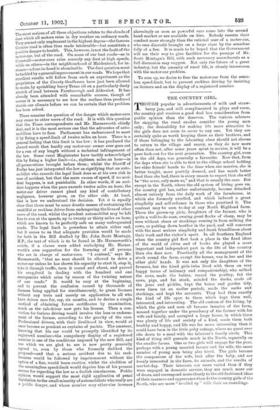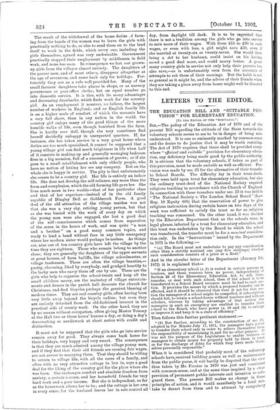THE COUNTRY GIRL.
THOUGH popular in advertisements of milk and straw- berry jam, and still complimented in plays and verse, the country girl receives a good deal less consideration from public opinion than she deserves. The various schemes for stopping the rural exodus consider the young men only; the desirability for making life more attractive to the girls does not seem to occur to any one. Yet they are certainly quite as worth keeping there as their brothers, and if those belonging to the labouring class should not choose to return to the village and marry, as they do now more often than not, after some years spent in service, it will be a poor look-out for the next generation. The country girl, even in the old days, was generally a favourite. Now that, froth the days when she is able to trot to the village school holding her elder friends' hands to the time when she marries, she is better taught, more prettily dressed, and has much better food than she had, there is every reason to expect that she will be "the same, only more so," and that is usually the case. But except in the North, where the old system of hiring goes on; the country girl has, rather unfortunately, become detached almost entirely from the daily work of the farmhouse, irt which she formerly excelled, and which induced a great simplicity and self-reliance in those who practised it. The contrast may be seen to-day at any North Highland farm. There the grown-up girls, daughters of the farmer, who is quite a well-to-do man, owning great flocks of sheep, may be seen without shoes or stockings coming in from milking the cows, or putting down heather in the yard, and will converse with the most serious simplicity and frank friendliness about their work and the visitor's sport. In all Southern England when the country girl first took a place in the fixed ideas of the world of cities and of books she played a more important and independent part in the life of the country than she does now. Practically all the management of the stock round the farm, except the horses, was in her and the other girls' hands. It was not only the daughters of the farmers, but the hired girls (who lived with them on very happy terms of intimacy and companionship), who milked the cows, made the butter, reared the poultry, fed the cows, pigs, and fat stock, minded the ducks, made all the jams and pickles, kept the house and garden tidy, wove linen (at an earlier period), made the socks and stockings, and kept the accounts. They had thus exactly the kind of life open to them which kept them well, interested, and interesting. The old custom of the hiring, by which the girls and men all became inmates of the farm, messed together under the presidency of the farmer with his wife and family, and occupied a large house, in which there was plenty of life and society of a kind, made them both healthy and happy, and life was far more interesting than it could have been in the little poky cottage, where no guest ever sits down to a meal with the labourer's family circle. This kind of thing still prevails much in the North, especially on the smaller farms. One or two girls will engage for the year, perhaps with a young married farmer and his wife, the same number of young men being also hired. The girls become the companions of the wife, look after the baby, and are keenly interested in the farm, its animals, and the results of market-day. Their interests are more varied than if they were engaged in domestic service, they are much more out of doors, and correspond more closely to the old-fashioned ideas of their manners and appearance than do the country girls of the South, who are more "levelled up" with their surroundings.
The result of the withdrawal of the home duties of farm- ing from the hands of the women was to leave the girls with practically nothing to do, or else to send them on to the land itself to work in the fields, which every one, including the girls themselves, agreed was very undesirable. Government practically stopped their employment by middlemen in field work, and none too soon. In consequence we lost our grown- up girls from the villages almost entirely. The daughters of the poorer men, and of most others, disappear altogether at the age of seventeen, and come back only for holidays. For- tunately they are as a rule well provided for. Many of the small farmers' daughters take places in shops, or as nursery governesses or post-office clerks; but an equal number go into domestic service. It is this, with its many advantages and decreasing drawbacks, which finds work for the country girl. As an employment it musters, we believe, the largest number of workers in England; and as English family life is on a higher scale of comfort, of which the servants have a very full share, than in any nation in the world, the country girl enjoys many of the good things of the more bumble walks of life, even though banished from the farm.
She is hardly ever dull, though she may sometimes find herself decidedly unhappy in unexpected quarters. If, for instance, she has taken service in a very great house where duties are too much specialised, it cannot be supposed that a young village girl can find much brightness in life when half of it consists in making-up and generally managing bedroom fires in a big mansion, full of a succession of guests; or if she goes to a small establishment with only elderly people, who have no notion of letting her see any company. But on the whole she is happy in service. The pity is that unfortunately she ceases to be a country girl. Her life is entirely an indoor life. She does not develop the self-reliance, any more than the form and complexion, which the old farming life gave her. She lives much more in two worlds—that of her particular class and that of her superiors—instead of in the old family republic of Dingley Dell or Gobblecock Farm. A good deal of the old attraction of the village maiden was not that she was a very shy. retiring young person, but that as she was busied with the work of every day on which the young men were also engaged, she lost a good deal of the self-consciousness which comes from separation of the sexes in the hours of work, and was quite "a man and a brother" on a good many common topics, and ready to lend a hand without fuss in any little emergency where her modern sister would perhaps be useless. As things are, nine out of ten country girls have left the village by the time they are eighteen. Those who remain belong to another class ; they are generally the daughters of the upper servants at great houses, of farm bailiffs, the village schoolmaster, or village tradesmen. These are often the village beauties,— pretty, charming, liked by everybody, and grudged heartily to the lucky men who carry them off one by one. These are the girls who help to organise the school-treats and keep all the small children merry, are the mainstay of village entertain- ments and dances in the parish hall, decorate the church for Christmas, and find bicycles perhaps the greatest blessing of modern times. They are real country girls, often having been very little away beyond the bicycle radius ; but even they are entirely detached from the old-fashioned interest in the practical side of county work. On the other hand, they are by no means without occupation, often giving Master Tommy at the Hall two or three hours' lessons a day, or doing a day's dressmaking or needlework at short notice with credit and distinction.
It must not be supposed that the girls who go into service remain away for good. They always come back home for their holidays, very happy and very smart. The consequence is that they are much admired among the village young men, and if they find that their old friends are earning fair wages, are not averse to marrying them. That they should be willing to return to village life, with all the cares of a family, and often with no very attractive cottage to live in, says a good deal for the liking of the country girl for the place where she was born. She exchanges comfort and absolute freedom from anxiety, a certain iscome, and her household friends for very hard work and a poor income. But she is independent, so far as the housework allows her to be; and the cottage is her own in every sense, far the husband leaves her in sole control all
day, from daylight till dark. It is to be regretted that there is not a tradition among the girls who go into service to save more of their wages. With from £15 to LIO in cash wages, or even with less, a girl might save 250, even if she married at twenty-six or twenty-seven. She would then bring a dot to her husband, could insist on his baring saved a good deal more, and could marry better. A great many country girls in service not only help their parents but also save,—as is unfortunately seen from the accounts of attempts to rob them of their earnings. But the habit is not so general as it might be, and the advice of their friends when they are taking a place away from home might well be directed to this end.











































 Previous page
Previous page